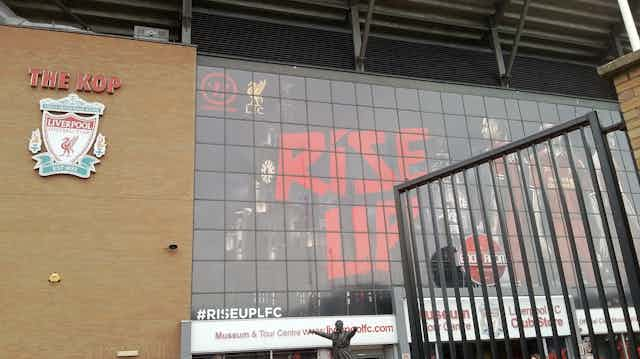To quote Liverpool Football Club’s American owners, it was a tumultuous week – but the turbulence has been very much of their making. On seeing 10,000 disgruntled supporters walk out of Anfield in the 77th minute of the Premier League match against Sunderland, Fenway Sports Group was recently taught a valuable lesson in public relations. And other clubs should take note.
If the Liverpool hierarchy didn’t understand the importance of symbiotic relationships with supporters in the business of football, it does now.
Why the backlash?
A tsunami of support for the much-publicised and unprecedented fan exodus has sent shockwaves far beyond the banks of the River Mersey. The discontent was in response to the club’s 2016-17 ticket price structure that would introduce a highest priced £77 ticket, albeit for just 200 seats on the newly developed £120m Main Stand. This represented a 25% increase on the current highest priced ticket, an accelerator for FSG to recoup its advance to fund the development.
Well, somebody’s got to pay for it. But at what expense?
In an era of multi-million pound player salaries, annual kit changes and escalating TV subscription costs, this latest income sapping initiative was seen as a step too far.
Add to this that Premier League clubs will each receive a £40m windfall when the new £8bn broadcasting rights deal kicks in next season, and the disgust of supporters the length and breadth of country was palpable.
Former England player turned BBC football pundit Gary Lineker captured the public mood tweeting:
This was the tip of the iceberg as the backlash even reached the UK parliament, where Merseyside MP John Pugh tabled an early day motion in the House of Commons urging other MPs to work with local supporter groups across the country to prevent football becoming “entirely determined by money and economic interest”.
Naturally, when the club rolled out the new pricing structure the headline figures pointed to its more favourable offerings including saying 45% of ticket prices would fall. But there, buried halfway down the release, was the now infamous line: “Matchday tickets have also stretched, making the cheapest matchday ticket just £9 and the most expensive £77 depending on seat location.”

Further digging compounded the problem for the Boston-based owners when a line on the sales and representation section of Fenway Sports Management’s website was unearthed next to the Liverpool club crest boldly claiming “transforming fans into customers”.
As the viral impact of social media fuelled supporter disdain further, that mantra was swiftly edited to read “transforming consumers into fans”. The damage had been done – you only had to listen to the chants that spilled from the concourses onto the streets around Anfield as nearly a quarter of the famous old stadium emptied with a game in full flow.
As the matter was subsequently debated by all forms of media, the initial protest was followed by the unfurling of banners further condemning the club’s approach at Liverpool’s FA Cup tie at West Ham.
Less than 24-hours later, an open letter to supporters was published on the club’s website in which principal owner John W Henry, chairman Tom Werner and president Mike Gordon admitted: “We got it wrong.”
The apology “for the distress caused by our ticket pricing policy” came as a pleasant surprise attracted praise from protest organisers and pundits alike.
The Suarez affair
After purchasing the club in 2010 from controversial and fellow US incumbents Tom Hicks and George Gillett, Henry and the others will not have forgotten the damage caused to the club’s global reputation a year later as they dithered over the Luis Suarez and Patrice Evra racism row.
Torn between protecting the club’s most saleable asset and the good name of Liverpool FC, reputations were shredded at every turn. It was only when main commercial sponsor Standard Chartered, just 12 months into an £80m four year deal, voiced its concern at being associated with such a high profile and sorry saga, did the owners step in. Apologies were eventually issued but, for many, it was too little, too late.
Threatened again with financial ramifications, this time prompted by the club’s often most undervalued asset, the fans, FSG was much swifter to seek redemption.
While all of this can be held up as a victory for fan power, a reminder that collective action can still work if the cause is justified, the bottom line has been reached where it so often does in the modern day sports business, with the balance sheet firmly in mind. Nonetheless, the U-turn will go some way to limiting the damage caused by the Anfield walkout and also to appeasing those who planned further direct action.
Importantly for FSG it protects the club’s brand and image from additional harm that, of course, will keep its commercial partners sweet.
The moral of the story
It was no coincidence that in the midst of the fallout Manchester United rolled out plans to freeze all ticket prices for next season – with other clubs expected to follow suit. But there’s still some way to go before club owners and supporters are singing from the same hymn sheet. Premier League clubs reportedly voted down a suggested £30 cap on tickets to away matches. Football Supporters Federation chief executive Kevin Miles warned: “Supporters will not let them off the hook,” adding:
Top-flight clubs have known since last year that they will be receiving a huge increase in their TV revenues. In the light of that windfall, Premier League clubs cannot justify maintaining high ticket prices, particularly for away fans.

